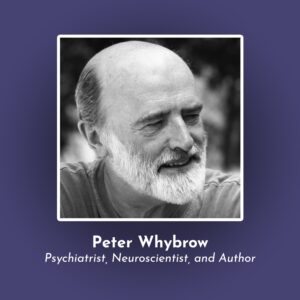
Ep 26 | Peter Whybrow
Peter Whybrow: “When More is Not Enough”
On this episode we meet with psychiatrist, neuroscientist, and author Peter Whybrow.
Whybrow gives us an overview of why humans tend to consume excessively in resource-abundant societies. Why is it difficult for humans to change our ways?
Additionally, Whybrow shares pathways for humans to move toward having a well-tuned brain.
About Peter Whybrow
Peter C. Whybrow, M.D. is Director Emeritus of the Jane and Terry Semel Institute for Neuroscience and Human Behavior at the University of California, Los Angeles, the Judson Braun Distinguished Professor of Psychiatry and Biobehavioral Sciences at UCLA’s David Geffen School of Medicine, and author of The Well-Tuned Brain: Neuroscience and the Life Well-Lived.
In French, we have a motto that says that a simple drawing is often better than a long explanation. Jean-Marc Jancovici Carbone 4 President
That’s very understandable because with left atmosphere thinking, one of the problems is that you see everything as a series of problems that must have solutions. Iain McGilchrist Neuroscientist and Philosopher
We can’t have hundreds and hundreds of real relationships that are healthy because that requires time and effort and full attention and awareness of being in real relationship and conversation with the other human. Nate Hagens Director of ISEOF
This is the crux of the whole problem. Individual parts of nature are more valuable than the biocomplexity of nature. Thomas Crowther Founder Restor
Show Notes & Links to Learn More
Download transcript03:15 – A Mood Apart
03:34 – The Dot-Com Bubble
03:50 – Dopamine
04:04 – American Mania: When More is Not Enough
04:27 – The Well Tuned Brain
08:11 – 1800s Irish migration
08:58 – Migrant gene DRD4-7R* Allele and correlation with the pursuit of novelty
10:31 – Dennis Meadows and TGS Episode
11:32 – Reflective vs reflexive thought
14:12 – Evolutionary Psychology
14:44 – Discount rate
15:05 – Evolutionary creation of the parts of the brain
16:15 – Adam Smith – The Wealth of Nations
16:25 – Humans are social creatures
17:30 – Feedback loops
18:07 – Adam Smith – The Theory of Moral Sentiments
20:19 – Loss aversion
21:27 – We are just as smart now as we were in the ice age
22:23 – People are addicted to “more”
22:45 – We are polluting the planet
23:45 – The neurology of chemical addiction can also apply to things like gambling and shopping
24:40 – The proximate vs the ultimate
25:32 – We have no social constraints anymore
28:19 – We try to compete for status with our peers
30:15 – Why it’s so difficult for us to constrain ourselves
31:15 – The importance of trust and empathy for human societies and self-constraint
33:25 – The importance of oil to plastic
34:11 – Rats and cocaine experiment
35:41 – The problem with infinite economic growth
36:10 – Waste from electric cars
37:35 – Evolutionary benefits of habits
38:10 – The mechanism of habits can be used to create addiction/bad habits
39:38 – Issues with current U.S. education system
42:09 – The frontal lobes and decision making
42:28 – Perception-action cycle
48:17 – John Gowdy TGS Episode
51:01 – Teaching social behavior in schools
52:13 – Finland education system + Book recommended by Peter Whybrow
54:40 – The US wealth gap – 50% of the population makes less than a living wage
56:05 – How much of our consumption stems from comparison to others?
57:28 – Analysis of the slums in post-world war London
1:04:20 – Social media can’t substitute for face-to-face interactions
1:06:54 – Humans shape each other’s behaviors
1:10:01 – The US is one of the only democratic countries in the world with just two parties







